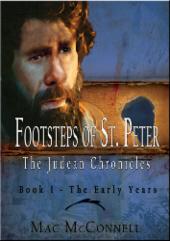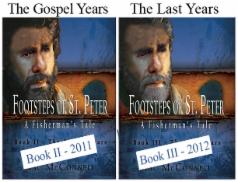Footsteps of St. Peter, The Judean Chronicles, The Early Years Book I
The first book of the new trilogy, Footsteps of St.Peter,
might also be know as The Gospel According to
Simon Peter, a memoir, Finalist for Book of the Year Award.
 Footsteps of St. Peter, Book I
Footsteps of St. Peter, Book I
A Judean Chronicle, the Early Years
144 pages 5.5 x 8.5
ISBN 9780980045154

We lived in Bethsaida, north on the Galilee at the mouth of the Jordon, right on the trade routes and the shipping port for Tiberius. Officially a township with the new synagogue, resident Rabbi and his want-a-be’s, as Father called them.
“I’m not against religion,” he says, “just the religious who ignore the needs of their flock and stuff their coffers with guilt offerings. They should call it a sin-a-gouge,” he loved to shout any time we were near. “Even the blind-boy won’t sit outside to beg—too much competition.”
Bethsaida is all the home I knew, a pagan city, Father thinks.
“Look what’s happening to our hometown. It’s too big, too many people, they build houses right on top of each other.” But he would admit, all this gave us a most demanding business. Father loved to work and even more to make a profit. But he could be more demanding than our customers as you may have gathered.
In the last couple of years not only the business grew, but the number of fishermen too. I remember tagging along with Father when we were the only fishing boat on the water.
“Those were the days,” Father grumbled, “days when a man could take his time, cull the fish or even skip a haul or two. Not anymore.”
“Sluggards,” Father call them, “They’re stealing our business.” He caught them fishing our chum lines more than once.
But the worst—listen to this—Father took an oar, and smashed the blades off in a rage when he caught a boat by our lines as the fog began to lift. His temper had the best of him—again. He spun around and threw the oar like a spear, right into the hull of the scoundrel’s boat.
“Get away from my lines, if you know what’s good for you.”
Such a throw. I never saw him do anything like that, and lucky for that fisherman, it punched a hole above the water line. I was amazed—no—thrilled.
I was sure we were about to have a war at sea but the other man and his crew limped back to shore shouting curses down on us, punching the air with angry fists. Father would have followed to “finish them off,” he said, but we felt the tug of full nets and had to pull them in. That gave Father time to cool off. That’s good. He didn’t need to add another scar or to his brawler reputation, Mother reminded him often.
When we beached our boat, the other boat, the one with the oar through the hull was beached there too.
“Father, you could just leave it alone. Maybe that fellow doesn’t know it was you.”
“I doubt that, Si, and if not, he’s about to.”
Father was not cooled off as he leaped from the boat, splashing through the morning tide.
“You the owner of this scow?” Father barked at a man leaning against the boat.
“No,” he turned, shook his head, and backed away.
Then Father grabbed the oar, whipped it back and forth, yanked it out and shoved it in the sand. He looked like a mighty warrior after a valiant kill. It was inspiring. Fishermen and customers alike became a crowd ready for a ruckus, thirsty for a fight.
Just then, breaking through the horde, stepped the rightful owner with the town’s magistrate and two scruffy Roman legionnaires.
“You there, back away from that weapon,” the magistrate said, acting more manly than he could ever be. We all knew him, Festus, another poor excuse for a man, according to Father.
“Weapon? This broken oar? You’re drunk. What weapon?” Father said in disbelief. The crowd thought that was worth a chuckle.
“You know exactly what weapon,” the owner said sliding behind the soldiers as Father yanked the oar and propped it on his shoulder. Now it was a weapon, and ready for action. I could barely contain myself.
“I’m not talking to you, you piece of …” I covered my ears. This was fisherman’s turf and there were no rules.
“Now listen here, Festus,” Father turned back to the magistrate, “this does not concern you.”
“Stand fast!” a soldier said stepping forward as if Father was going to do someone some bodily harm.
“Festus, this pig, swine, this horses’ ass was working my chum lines this morning. He should be the one you are hounding.”
“That’s not the way we hear it Jonah. You attacked him, he said, and just for fishing where you thought you should be fishing. Then when he wouldn’t leave, you threw that spear and tried to kill him.”
“What? Hah! I didn’t try to kill anyone. If I wanted him dead, trust me, he’d be dead.”
“That’s enough for me.” The other soldier grabbed Father’s wrist, swung him around and twisted his arm behind his back. Father buckled and spewed a string of curses I won’t repeat. The oar fell and rolled over to my feet. I was tempted.
“What are you doing?” Father protested, “arrest that man, not me.”
Father was on his knees. The guard had Father’s arms locked behind. What could I do? I went over and kicked the soldier as hard as I could. “Let him go,” I screamed.
He swatted me away, knocked me on my butt and started
dragging Father up the road. I went for the oar, but too late.